Tools for the Field
Translating evidence-based practices (EBPs) from research into practice in the justice and treatment systems is essential for improving both client-level and system-level outcomes. Researchers at ACE! have created several tools to help organizations translate and implement EBPs effectively.
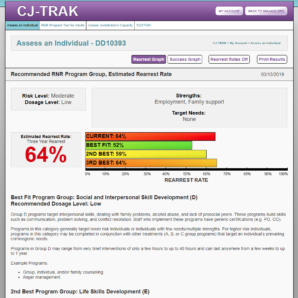
RNR Simulation Tool
The RNR Simulation Tool contains a series of decision support tools for use in the justice and treatment fields. This tool is designed to assist justice and treatment agencies in determining what forms of programming will be most effective in reducing recidivism and improving outcomes within their population. The tool is also designed to guide resource allocation and help jurisdictions identify service provision gaps. It is made up of three linkable portals that provide decision-support at the client (Assess an Individual), program (Program Tool for Adults), and system level (Assess Jurisdiction's Capacity). Used together or separately, these tools can have a significant impact on recidivism at a system level. Download our FAQ or click the button below to learn more.

When Agencies Partner
When Agencies Partner is a SAMHSA-supported handbook intended to help correctional agencies and treatment providers build and maintain strong, collaborative partnerships. It includes worksheets, checklists, and a guide to using the RNR Simulation Tool.
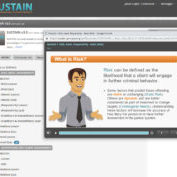
SUSTAIN
SUSTAIN (Staff Undertaking Skills to Advance Innovation) is a learning system that consists of both eLearning and coaching. It is designed to assist professionals in building skills associated for the effective management of individuals involved in the criminal justice system. The system consists of six core training modules: Risk-Need-Responsivity, Motivation and Client Engagement, Case Planning, Problem Solving, Desistance, and Criminal Lifestyle. The modules focus on both knowledge and skill enhancement. Click the button below to learn more.
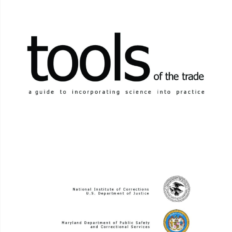
Tools of the Trade: A Guide to Implementing Science Into Practice
Funded through different initiatives with the National Institute of Corrections, the Maryland Division of Parole and Probation, the Maryland Governor's Office of Crime Control and Prevention, and the University of Maryland's Bureau of Governmental Research (now Institute for Governmental Service and Research), Tools of the Trade makes research literature in the field accessible to all by translating research into strategies for practice. It functions as an on-site training tool and helps users understand core concepts with key exercises that apply the core concepts.
“Tools of the Trade: A Guide to Implementing Science Into Practice,” (with Eric Shepardson and James M. Byrne). National Institute of Corrections, Maryland Division of Parole and Probation, and Maryland, Governor’s Office of Crime Control and Prevention, Washington, DC: National Institute of Corrections, 2004.
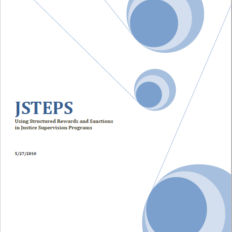
JSTEPS: Using Structured Rewards and Sanctions in Justice Supervision Programs
JSTEPS is designed as a tool to adapt an evidence-based practice of Contingency Management into supervision and specialized court settings. This training manual is designed to provide users with the practical information necessary to implement the JSTEPS protocol in various justice settings. A particular focus of this manual is the use of the JSTEPS software to support the structured behavioral contract, sanctions, and rewards that define contingency management interventions. This manual was funded with a cooperative agreement from the National Institute on Drug Abuse under U01 DA 16213, Advancing Treatment in the CJS; CJ-DATS is funded by NIDA in collaboration with: SAMHSA, CDC, NIAAA, and BJA.
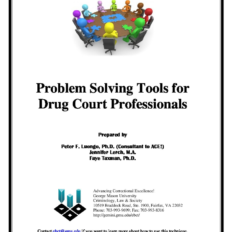
Problem Solving Tools for Drug Court Professionals
Funded by the National Institute on Drug Abuse in collaboration with: Substance Abuse and Mental Health Services Administration, the Centers for Disease Control and Prevention, the National Institute on Alcohol Abuse and Alcoholism, and the Bureau of Justice Assistance, Problem Solving Tools for Drug Court Professionals serves as a training manual to assist drug court (DC) teams to evaluate the usefulness and effectiveness of a DC participant’s treatment plan and progress. These guidelines are an introduction to a standard, easy to replicate and monitor method of gathering and critically evaluating information about the progress of the participant.
“Problem Solving Tools for Drug Court Professionals,” (with Peter F. Luongo, Jennifer Lerch, and Faye Taxman). Funded by NIDA with SAMHSA, CDC, NIAAA, BJA (NIDA U01 DA 16213). Fairfax, VA: George Mason University.
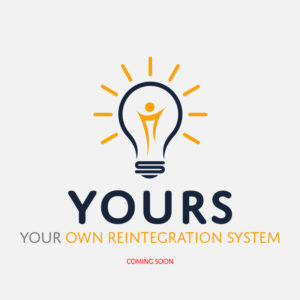
YOURS
YOURS (Your Own Reintegration System) is designed to be an interactive workbook for individuals on community supervision that helps assess “where they’re at” and work through goals. YOURS has been used by both community supervision and treatment providers to empower clients.
The electronic version of YOURS is currently in development. For information on the existing YOURS tool, please contact us at ace@gmu.edu.
Please contact ACE! at ace@gmu.edu if you have questions about any the following curricula/resources:
- “SOARING!! Offenders & Communities,” (with Elizabeth Katz). Richmond, VA: VCU.
- “Step ‘n Out”: Behavioral Management for Probation and Parole,” (with Elizabeth Katz, Peter Friedmann, and others). CJ-DATS Protocol. Rhode Island: Brown University.
- “Case Planning in a Contractual Mode: Applications for Probation and Parole Offices,” (with Dace Svikis, Lori Keyser-Marcus, and Diane Langhorst). Richmond, VA: VCU.
